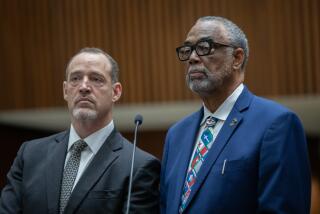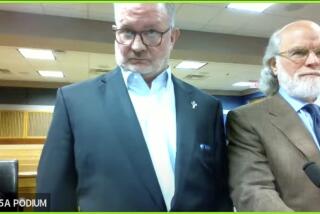Montgomery Seeks to Withdraw Guilty Pleas on Conflict of Interest : Courts: Former Moorpark city councilman says he was coerced into signing the plea agreement.
- Share via
MOORPARK — Saying that he was coerced into pleading guilty to a crime he did not commit, former Moorpark City Councilman Scott Montgomery filed a motion Thursday in Superior Court to withdraw his felony and misdemeanor guilty pleas for a conflict of interest.
Montgomery said in a declaration filed with the court that his fear of losing his job as a computer parts salesman and of going to jail clouded his judgment and led him to plead guilty Oct. 12 to charges that he accepted a $3,500 loan from a rubbish company executive and then voted to extend a city trash contract with the firm.
Set to be sentenced Nov. 21, Montgomery faces a possible 3 1/2 years in jail and a $1,000 fine.
According to declarations from Montgomery and his attorney, Dan Schmidt, Montgomery was given an ultimatum by Deputy Dist. Atty. Mark Aveis to plead guilty to the felony and misdemeanor charges by noon on Oct. 12 or face a jury trial for the conflict of interest charges and face an additional charge of perjury for statements he made under oath before the grand jury. If convicted, Montgomery would have faced a mandatory prison term of at least two years.
Montgomery said he thought it was OK to accept a $3,500 payment from Manuel Asadurian Sr.’s firm, G.I. Sweeping, because company officials had assured him there was no connection between the sweeping company and another Asadurian-run business--G.I. Rubbish. It is G.I. Rubbish that has exclusive trash-hauling contracts in Moorpark.
If he had known there was a connection between the two companies, Montgomery told the grand jury, he would not have accepted the money. But Aveis told Montgomery that his explanation was not credible.
“Everybody knows that Manny Asadurian is the trash king of Ventura County,” Aveis reportedly told Montgomery. “A jury would just eat this stuff up.”
Montgomery said in the declaration that he waited until five minutes before the deadline to agree to make the plea.
“Although I reviewed the plea agreement form provided by Mr. Aveis and initialed and signed where he directed,” Montgomery said, “I was so confused and shocked by the events of the last few minutes that I didn’t comprehend all the rights I was forfeiting.”
By pleading guilty, Montgomery said he was told by prosecutors, his felony charge could be reduced to a second misdemeanor, which would allow him to avoid imprisonment. The misdemeanors also would be removed from his record after two years, Schmidt said Thursday.
For Montgomery to now withdraw the plea, his attorney must show the court that there were mistakes made during the grand jury inquiry, or that the prosecutors were “over-reaching” in their attempts to coerce Montgomery into making his plea.
“Scott was scared out of his wits by what they said,” Schmidt said. “But he was never given the opportunity to view the evidence against him, and he was prevented from his right to counsel.”
Schmidt said that Montgomery was not allowed to consult with him while he was being questioned by Aveis in front of the grand jury, and that the prosecutor ignored Montgomery’s right to avoid testifying against himself.
Schmidt also said that Aveis was trying to undermine Montgomery’s confidence in Schmidt’s ability as an attorney, saying that Schmidt didn’t have trial experience, and at one point telling Schmidt in a voice loud enough for Montgomery to hear: “I just don’t think you are doing your client a service.”
More to Read
Sign up for Essential California
The most important California stories and recommendations in your inbox every morning.
You may occasionally receive promotional content from the Los Angeles Times.













